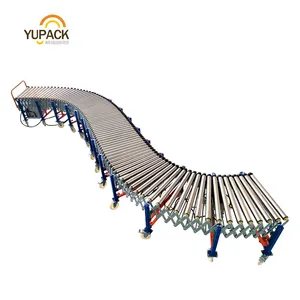Introduction to Flexible Conveyors
Flexible conveyors are innovative material handling solutions designed to move products efficiently in various environments. They are versatile, adjustable, and can easily accommodate various shapes and sizes of items, making them ideal for a myriad of applications in manufacturing, warehousing, and distribution. Their dynamic nature helps streamline operations, enhance productivity, and reduce labor costs.
Types of Flexible Conveyors
- Expandable Roller Conveyor: Comprising a series of rollers, this type of flexible conveyor allows for easy modifications in length and height, facilitating the effortless movement of items.
- Belt Conveyor: Featuring a continuous belt, this form excels at transporting products over level or inclined surfaces, providing smooth and reliable performance.
- Flexible Skate Wheel Conveyor: This type utilizes skate wheels that can pivot, allowing for gentle, multidirectional movement of goods to offer flexibility in tight spaces.
- Telescoping Conveyor: Perfect for loading and unloading trucks or shipping containers, this conveyor can extend and retract as needed to adapt to varying loading dock heights.
Applications of Flexible Conveyors
- Warehousing: Flexible conveyors facilitate the efficient movement of goods in and out of storage areas, ensuring streamlined operations.
- Assembly Lines: In manufacturing settings, these conveyors optimize the flow of components to assembly stations, enhancing speed and efficiency.
- Packaging: They serve an essential role in packaging processes by transporting finished goods to labeling and packing areas with ease.
- Shipping and Receiving: Ideal for loading and unloading parcels, flexible conveyors adapt to various shipping container or truck heights, maximizing productivity during transit operations.
Features and Advantages of Flexible Conveyors
- Adjustable and Configurable: These conveyors can be easily reconfigured to fit different layouts and operational needs, allowing for adaptability in fast-changing environments.
- Space-Saving Design: Flexible conveyors can collapse or fold when not in use, helping to save valuable floor space in warehouses or production areas.
- Easy to Move: Lightweight designs and mobility features make it simple for operators to relocate conveyors as required for various tasks.
- Reduced Labor Costs: By automating material handling, flexible conveyors minimize the need for manual labor, thereby saving costs while ensuring safety.





















































